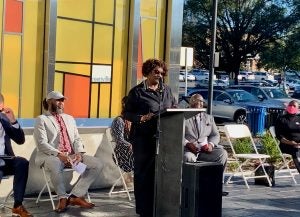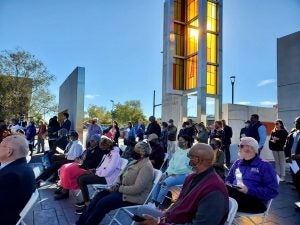African American Cultural Trail of Greenville-Pitt County Launch

Ann Floyd Huggins stands at the podium with other key speakers in the background at the African American Cultural Trail of Greenville-Pitt County launch celebration at Greenville Town Common.

Attendees at the African American Cultural Trail of Greenville-Pitt County launch celebration.
ECU Libraries were proud to be represented at the launch of the new African American Cultural Trail of Greenville-Pitt County. Jennifer Daugherty, Layne Carpenter and Heather White serve on the City’s AACT committee.
A launch celebration was held Oct. 27 at Sycamore Hill Gateway Plaza, one of the initial six stops along the trail. Community remarks were made by Greenville Mayor PJ Connelly, Pitt County Commissioner Ann Floyd Huggins, Kyma Lassiter with the African American Heritage Commission, Jermaine McNair representing NC Civil and Diane Taylor, Pitt-Greenville Convention & Visitors Authority Chair.
“The small group expanded to more than 25 people, which includes diverse stakeholders and interested individuals from throughout Pitt County. Together, we ignited the fire to bring the trail to life,” Huggins said. “Greenville and Pitt County joins many other areas across the country in creating an African American trail, such as Durham, Boston, Kansas City, Washington, D.C., and New Orleans. This is a living, breathing project to share the history of downtown community with generations now and those to come.”
This trail is an ongoing project as additional content and potential stops will continue to be researched and added across Greenville and Pitt County.
“This is a living thing. It is something that we are proud of and we’ll continue to be proud of and invest in,” Taylor said.
The African American Cultural Trail of Greenville-Pitt County was created to celebrate the rich history and recognize the many contributions that African Americans have made to the growth and development of our city and county. The trail allows people to experience the lives, stories and history of our early black educators, medical professionals, cultural leaders and residents, starting at the beautiful Sycamore Hill Gateway Plaza, where Israel and Annie Adams established the Sycamore Hill Baptist Church in 1865. It flows to the former vibrant Shore Drive Neighborhood before urban renewal at Town Common, and where the first African American hospital stood in downtown, to the social and entertainment center of Greenville’s African American community referred to as “The Block,” and more.
“As residents and visitors travel the African American Cultural Trail, I hope they learn from the experience and gain a better appreciation for the people and places that helped shape our city,” Connelly said. “There are many stories to be told. I would like to personally thank the Greenville-Pitt County Convention & Visitors Bureau for leading the way for the development of this trail in sharing some of those great stories.”
